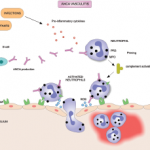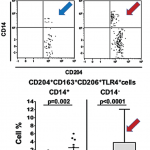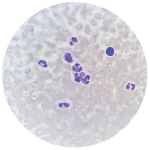NEW YORK (Reuters)—AbbVie Inc.’s rheumatoid arthritis drug Humira (adalimumab) and Roche Holding AG’s cancer drug Rituxan (rituximab) topped a list of seven treatments whose combined 2017 and 2018 price hikes accounted for a $5.1 billion increase in U.S. spending, a report released on Tuesday showed.1 The price hikes were more than twice the rate of…
Search results for: rituximab

Nintedanib Slows Lung Deterioration in General Fibrosing Interstitial Lung Disease
NEW YORK (Reuters Health)—Nintedanib dramatically slows lung deterioration in patients with progressive fibrosing interstitial lung diseases, according to a new randomized study.1 Nintedanib has already been shown to be effective against idiopathic pulmonary fibrosis (IPF). The new trial, funded by the manufacturer, Boehringer Ingelheim, and presented t the European Respiratory Society International Congress 2019 in…

Ankylosing Spondylitis & Uveitis: An Ophthalmologist’s Perspective
It’s often said the eyes are the window to the soul, and in the case of ankylosing spondylitis and other spondyloarthropathies, one can also say the eyes are the window to systemic disease. Although uveitis occurs in approximately 2–5% of patients with inflammatory bowel disease, 6–9% of patients with psoriatic arthritis and 25% of patients…

Stay the Course: How to Maintain Remission in Vasculitis
MADRID—During the 2019 European Congress of Rheumatology (EULAR), held June 12–15, speakers addressed the complexity of vasculitis in a Challenges in Clinical Practice session titled, How to Maintain Remission in Vasculitis. Although vasculitis appears in many varieties, one commonality exists among these related yet distinct conditions: When there is vital organ or systemic involvement, disease…

Study Probes Whether Belimumab Can Lower Vasculitis Relapse Rate
In an international clinical trial, adding the drug belimumab to standard maintenance therapy for patients in remission with vasculitis did not lower the relapse rate. The double-blind, placebo-controlled study evaluated the safety and efficacy of belimumab as adjunctive therapy to maintain remission in anti-neutrophil cytoplasmic antibody (ANCA) associated vasculitis (AAV). Results of the multi-center, industry-sponsored…

New Studies Identify Possible Markers of Early Systemic Sclerosis
Although the true cause of systemic sclerosis (SSc), or scleroderma, remains unknown, researchers have made progress in detecting the autoimmune disease’s early presence. Beyond the physiological signs of Raynaud’s phenomenon, a capillaroscopy can detect alterations in microcirculation and lab tests can confirm the presence of telltale autoantibodies, such as anti-topoisomerase 1, anti-centromere and anti-RNA polymerase…

Rheumatology Drugs at a Glance, Part 3: Rheumatoid Arthritis
Over the past few years, biosimilars and other new drugs have been introduced to treat rheumatic illnesses. Some of the conditions we treat have numerous drug options, others have few or only off-label options. This series, “Rheumatology Drugs at a Glance,” provides streamlined information on the administration of biologic, biosimilar and small molecule inhibitor drugs…

In Wake of Lupus Trial Failure, New Research Attacks From Many Angles
CHICAGO—When Richard Furie, MD, was first asked to speak about lupus at the 2019 ACR State-of-the-Art Clinical Symposium, held April 5–7, organizers suggested he discuss low disease activity and classification criteria. But Dr. Furie, a professor of medicine at the Donald and Barbara Zucker School of Medicine at Hofstra/Northwell, Hempstead, N.Y., and a veteran investigator…

Research Advances Continue in the Fight Against Lupus
SAN FRANCISCO—The 13th International Congress on Systemic Lupus Erythematosus (SLE), held April 5–8, highlighted continuing advances in the fight against lupus, a chronic, inflammatory, autoimmune disease affecting multiple organ systems. The rheumatologist’s ability to control this incurable and life-threatening condition is limited both by its heterogeneous presentation and by the lack of successful treatment options,…

Case Report: Sjögren’s Syndrome Plus Neuromyelitis Optica Spectrum Disorder
Sjögren’s syndrome is a chronic multi-system autoimmune disease characterized by inflammation and subsequent destruction of exocrine glands. Sjögren’s syndrome can present with glandular or extra-glandular manifestations. Neuromyelitis optica spectrum disorder (NMOSD) is a rare central nervous system (CNS) autoimmune disease that can present as the initial manifestation in less than 5% of patients with Sjögren’s….
- « Previous Page
- 1
- …
- 22
- 23
- 24
- 25
- 26
- …
- 46
- Next Page »